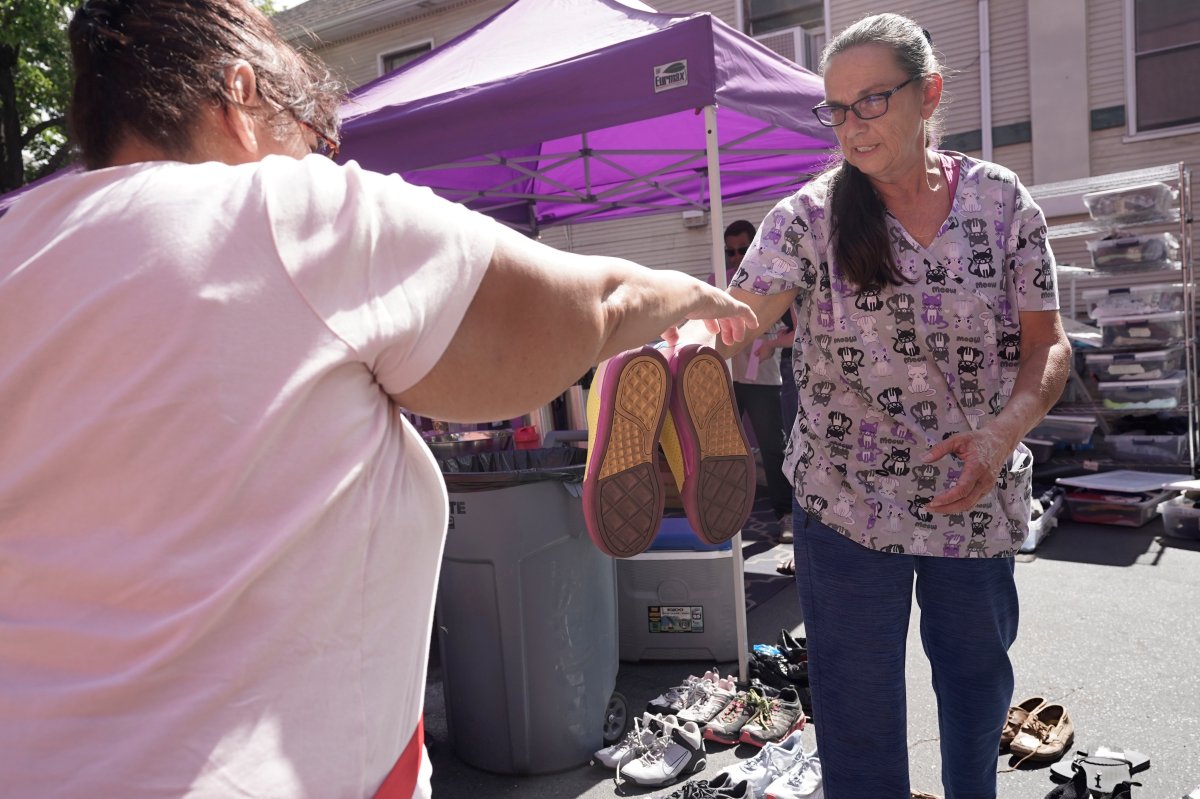Several Ontario lawyers and the Canadian Human Rights Commission are speaking out about a proposed bylaw change in Barrie that would restrict people and charities from helping individuals experiencing homelessness.

The proposed amendment to Bylaw 2004-142, known as Bill 067 and 068, would prohibit the distribution of items including food, clothing, tents or tarps in public parks or on public lands without a permit and prohibit. A permit would also be required for the distribution of food and grocery products in public spaces.
A motion to make the changes to the bylaw was carried out at Barrie City Council on May 17, and if the changes are approved during Wednesday night’s council meeting, they will take effect immediately.
The bylaw states that individuals caught breaking it could face a fine of up to $5,000; organizations could face a fine of up to $100,000.
Violating the Charter of Rights and Freedoms
News of the bylaw amendment has prompted an outcry from homeless advocates and legal experts who say the changes violate the Canadian Chart of Rights and Freedoms.
“Hopefully, at the end of the day, they will decide that this is not a good idea and that Barrie does not want to be known as the leading city in Canada when it comes to the cruel treatment of homeless people,’ says Jeff Schlemmer, executive director of Community Legal Clinic of York Region.
Schlemmer and another lawyer co-authored a letter to council outlining how they think the bylaw violates the Constitution and Charter of Rights for both people who want to help and those who wish to receive it.
“The thing about the Charter of Rights and Freedoms is it says that we are free to do whatever we want in our society except where there are reasonable limits imposed which are justified in a free and democratic society,” he says.
Schlemmer says if passed, the bylaw would infringe on the Canadian Charter of Rights and Freedoms, in particular Section 2 (a) and (d) freedom of conscience and religion and freedom of association, and Section 7, the right to life, liberty, and security of the person.
“One of the fundamental freedoms that we have is freedom of conscience. So freedom of conscience means free to act according to our conscience, except where we’re not allowed to, and in Canada generally, we’re allowed to give things to people if we want to,” he told Global News. “The question is whether a government can take away that right or restrict it in any way, and our view is that they cannot, and certainly can’t do it for the reasons they’re talking about.”
He says the bylaw also takes issue with Section 7 of the Charter regarding people’s right to life.
“The right to life is more than just saying you have a right not to be killed. It means that you’re entitled to doing things necessary to sustain life, one of them being to get food and shelter,” he says.
In the joint letter, he and fellow lawyer Sharon Crowe say, “The proposed bylaws are unlawful and will be struck down by our Courts, but not without first inflicting grievous harm on your most vulnerable citizens.”
The two are also not alone in their views.
Sujit Choudhry, head of chambers at Haki Chambers Law firm who practices constitutional law and is currently representing homeless individuals in an encampment in Hamilton, says the actions of the City of Barrie are a first.
“The proposed bylaw is flagrantly unconstitutional, and it’s actually shocking,” he told Global News.
“What this bylaw does is unprecedented. It proposes to criminalize private charity that would consist of providing homeless individuals with the necessities of life, including food, and I’ve never seen such a thing.”
He says courts across Canada are starting to rule that encampment evictions are unconstitutional and that the same would likely be true here.
“As far as I know, it’s the first time in Canada that a municipality is going to prohibit giving food to a homeless person by someone in an act of charity, and I think that that violates Section 7 of the Charter, which guarantees everyone the right to right to life, liberty and security of the person.”
The Canadian Human Rights Commission’s Federal Housing Advocate also penned an open letter to the city, urging them to change course.
“These measures would severely restrict access to basic shelter and food for people living in local homeless encampments and, as such, are in direct contravention of international human rights standards,” the letter read in part. “I want to draw your attention to the city’s obligations to respect, protect and fulfill the human rights of encampment residents. The National Housing Strategy Act (2019) recognized that housing is a fundamental human right and that housing is essential to the inherent dignity and well-being of the person. I want to underline that all Canadian municipalities have a responsibility to uphold the human rights of people living in encampments.”

What the City of Barrie says
When asked about the backlash about the impending changes, the City of Barrie shared a statement saying the changes would not prohibit agencies from distributing help within the community and that it only applied to public property.
But the list of places it applied to was extensive and included many places people without a home frequent, including parks, open spaces, urban squares, sports fields, parking lots, and vacant or other lands owned or managed by the City of Barrie. It also includes a highway, roadway, sidewalk, pedestrian way, boulevard, or watercourse.
“Organizations would be able to continue their food outreach programs on their own property or any property in the community not owned by the City where permission for such distribution to occur has been granted,” the city says in the statement.
Staff say the current bylaw prohibits individuals or corporations from distributing food and supplies on City property but does allow charitable organizations to do so – the change is to extend the prohibition to all organizations.
The city is instead encouraging people to support local agencies that provide support.
A public meeting of the community safety committee to review actions taken has been scheduled for Tuesday, Sept. 19, several months after the vote.
Advocates say this approach won’t work
Jennifer van Gennip, a Barrie Housing and Homeless Justice Network member and co-chair of Ontario Alliance to End Homelessness, says this strategy will only worsen things.
She says the changes came as a shock since there was no public consultation beforehand.
“What they say they want you to do instead is give money directly to charities and then the charities to help, except it also hinders charities’ ability to help to meet people where they are,” van Gennip says.
“I think what we would see is people being a lot more reluctant to help give $5 or to give a bottle of water or a sandwich. I think we’re going to see people be more nervous about helping each other.”
Advocates also describe the change as being very un-Canadian.
“The biggest thing that offends me is a municipality telling me that I can’t help somebody who needs help. I think that that’s completely inconsistent with Canadian values as protected by the Charter. We are known as a caring country; that’s one of our core values, and for a municipality to tell me that I’m not allowed to do that on public property is deeply offensive to me,” Schlemmer says.
Those who spoke with Global News all say the proposed changes don’t address the root issue, which is a lack of housing.
Schlemmer says over the last five years, the lack of affordable housing has created a situation where more and more people can’t find a place to live.
“So these are (people) no different than the rest of us. They are exactly the same, except for some bad luck. Bad luck has gotten a lot worse in the last five years for two main reasons, one of them being the rents … and the other is that social benefits and housing allowances have been pretty well frozen, so if they’re forced to move they cannot find a place to live,” Schlemmer says.




Comments